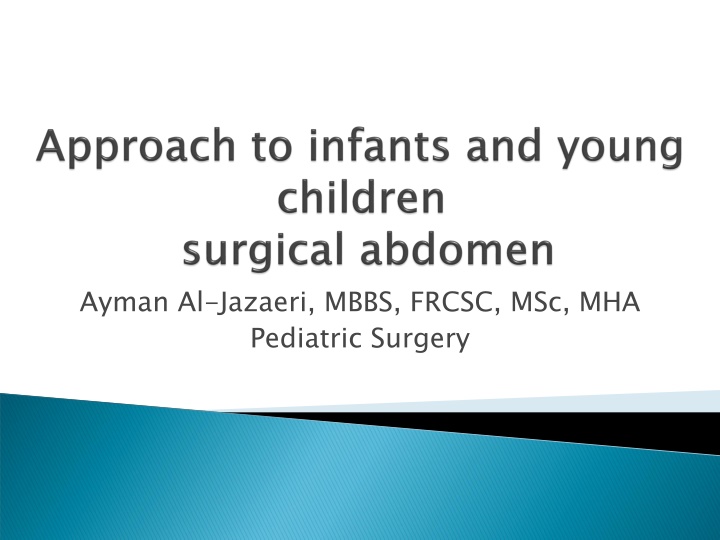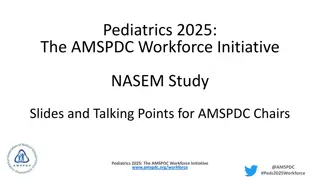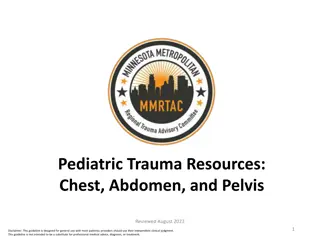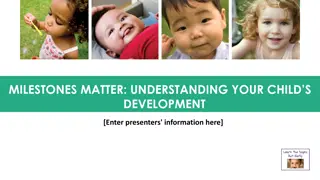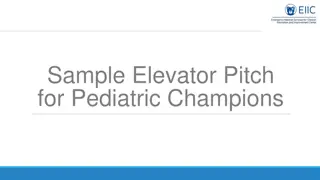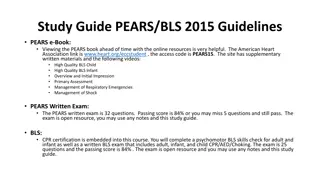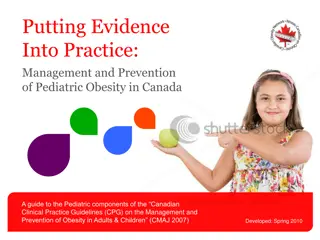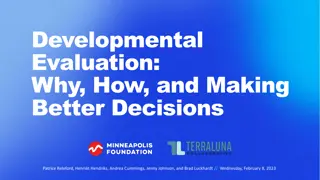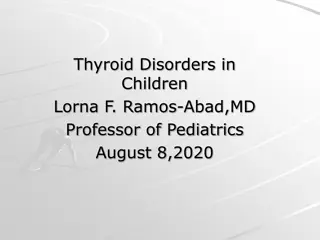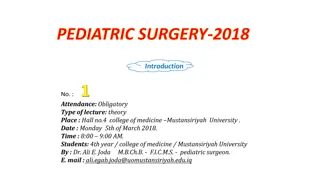Pediatric Surgery and Developmental Milestones
Ayman Al-Jazaeri, a skilled pediatric surgeon, discusses the impact of age on medical history sources, symptoms, and signs in young children. The content also delves into communication challenges, feeding and growth issues, bowel movements, crying patterns in babies, and overall development encompassing physical, psychological, and metabolic aspects.
Download Presentation

Please find below an Image/Link to download the presentation.
The content on the website is provided AS IS for your information and personal use only. It may not be sold, licensed, or shared on other websites without obtaining consent from the author.If you encounter any issues during the download, it is possible that the publisher has removed the file from their server.
You are allowed to download the files provided on this website for personal or commercial use, subject to the condition that they are used lawfully. All files are the property of their respective owners.
The content on the website is provided AS IS for your information and personal use only. It may not be sold, licensed, or shared on other websites without obtaining consent from the author.
E N D
Presentation Transcript
Ayman Al-Jazaeri, MBBS, FRCSC, MSc, MHA Pediatric Surgery
Realize the impact of age Where/who are the history sources Recognize and interpret the important symptoms Important signs
Less than 3 Difficult to communicate Verbal expression Fear of strangers History sources Mother is the best source Social barrier less than what we expect Father is not very reliable Nurses are reliable Not always possible Important in PICU/ NICU Other doctors Less than 3- -4 year Difficult to communicate 4 year History sources
Feeding & Growing Feeding well and growing healthy baby Poor feeding Sick baby from any GI or systemic cause (ear infection) GI obstructed Pain Persistent vomiting Frequency Color Milk vs greenish Force Projectile proximal obstruction Small amount after each feeds regurgitation normal as long as gaining wt Feeding & Growing Persistent vomiting Sick baby Sick baby
Bowel movement (BM) Bowel movement (BM) Frequency What is the normal for infant? Constipated, obstructed Failure to pass meconium in newborns Frequency Consistency Loose / watery diarrhea Firm & dry constipation Consistency Color Very pale ? Black Melena Bright red Color
Crying baby Babies communicate their needs by crying Hungry Wet Crying baby Babies communicate their needs by crying At >6 month Want to be carried Want to play At >6 month they learn to cry for other reasons they learn to cry for other reasons Bay who continue to cry, refuse feeding and dry Abdominal pain Ear ache Bay who continue to cry, refuse feeding and dry pain pain Non Non- -crying baby can be worrisome !!! crying baby can be worrisome !!!
Development Development Physical growth (height and weight) Chronic problems ( Metabloic, Nutrition => gut health Physical growth (height and weight) Nutrition => gut health) Psychological Mental problem, chromosomal abnormalities Psychological Motor Syndrome Metabolic Motor
External abnormality seen/felt as abnormal by parents External abnormality a anything that is Swelling Abscess Mass (lymph node, Tumor, Cyst, Hernia) Swelling Color changes Inflammation Rash Vascular malformation Color changes
Mental changes Mental changes Responsiveness Responsiveness Sleepy Not interested in feeding Indicates; sepsis, shock, CNS trauma, metabolic (O2, Glu, urea)
Vomiting Constipated / diarrhea Poor feeding Abdominal distension Palpable mass (felt by parents) Very dark or very pale colored stool Vomiting Constipated / diarrhea Poor feeding Abdominal distension Palpable mass (felt by parents) Very dark or very pale colored stool
Vital sings Fever RR, BP, HR, O2 Sat Vital sings Consciousness (crying) Crying baby not very sick (not critical) Unusually calm baby who doesn t respond normally sick Consciousness (crying)
Exam while crying Can t hear the chest well Focus on inhalation Exam while crying Can t hear the chest well Can t examine abdomen well Examine while taking breath Keep hand on abdomen Can t examine abdomen well Can t concentrate Parent are stressed less time Can t concentrate
Otherwise similar to adult A good history = a good logical story Known major Predisposing factors Describe the current problem Other risk factors Symptoms of other possible complications
Due to the relative difficulties in taking a reliable history and performing an accurate physical exam We tend to depend more on diagnosing the underlying problems in Due to the relative difficulties in taking a reliable history and performing an accurate physical exam We tend to depend more on investigations diagnosing the underlying problems in infants investigations in in infants
